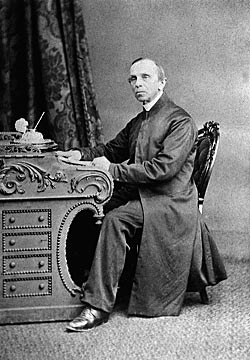Pecherin, V. S. 1807-1885
Enlarge text Shrink textVladimir Sergeyvich Pecherin (Владимир Сергеевич Печерин) (27 June 1807 – 28 April 1885), was a Russian nihilist, Romantic poet, and Classicist, who later became a Roman Catholic priest in 19th-century Ireland. A member of the hereditary Russian nobility from Odessa, Pecherin grew up witnessing his father regularly beating both the servants and his own mother. After he was an adult, he completed his education at State expense at the Friedrich Wilhelm Royal University in the Kingdom of Prussia and then briefly served as a Professor of Classics at the Imperial Moscow University. Then he unexpectedly left both his faculty position and the Russian Empire to become a dissident intellectual who rejected and denounced both Christianity and Tsarism. After several years of living in Europe, Pecherin shocked everyone who knew him by converting from Atheism to the Roman Catholic Church. He eventually was ordained to the priesthood and spent the remainder of his life ministering to the poorest of the poor in the tenement slums and hospitals of Dublin, Ireland. As a former Westernizer, Fr. Pecherin's autobiographical notes and in his letters to other Russians provide a historical context to the ideological evolution of the Russian intelligentsia during the 1860s and 1870s. Pecherin's writings present the Russian Zeitgeist of the period artistically. In his native Russia, where Pecherin, despite his later religious conversion, remained, "a powerful symbol of anti-Russian sentiment and religious apostasy", he is believed to have inspired many characters in Russian literature, particularly in the novels of Mikhail Lermontov and Fyodor Dostoevsky.
Read more on Wikipedia >
 Personality
Personality



